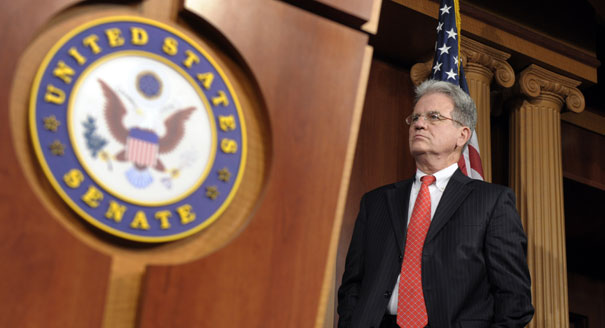Share this
From Politico:

By JENNIFER HABERKORN | 7/28/11 12:41 PM EDT
President Barack Obama and House Speaker John Boehner failed to strike a “grand bargain” on the nation’s deficit, but they may have pulled off another trick: revolutionizing the debate over Medicare.
When they both accepted the idea of increasing the Medicare eligibility age to 67, they gave a controversial idea more legitimacy and high-profile support than it’s ever gotten before.
The White House’s Fiscal Commission, led by Erskine Bowles and Alan Simpson, listed the idea of raising the eligibility age with the likes of such dramatic structural changes as the public option, block grants or an all-payer system. Alice Rivlin and former Sen. Pete Domenici didn’t even bring up the idea in their deficit report. And the top Democrats in both the House and Senate brushed aside the concept just last month.
But now the idea of raising the eligibility age has gotten the support of Obama and Boehner. While the age change is not expected to be part of the latest debt ceiling compromises, the idea is now likely to be a permanent fixture in the Medicare debate and, someday, to become a reality.
The idea has been loosely supported by Republicans in the past.
When Sens. Tom Coburn (R-Okla.) and Joe Lieberman (I-Conn.) introduced a bill last month gradually moving the eligibility age up by two years, Democrats ran from it. House Democratic Leader Nancy Pelosi called it “unacceptable” and said, “it is unfair to ask seniors to get less in benefits and wait longer to get onto Medicare.”
Senate Republican Leader Mitch McConnell didn’t endorse the Coburn-Lieberman proposal but applauded the effort. Grover Norquist’s Americans for Tax Reform backed the plan.
The argument in favor of moving the eligibility age is that when Medicare was created in 1965, Americans were not living as long. The program is now one of the nation’s greatest cost drivers.
“Because of increases in life expectancy, the average length of time that people are covered by Medicare has risen significantly since the program began in 1965,” the Congressional Budget Office wrote in March. “That trend, which increases the program’s costs, is expected to continue.”
The health care reform law — which in 2014 bans insurers from turning down any patient — could make moving the eligibility age up more politically palatable because 65-year-olds would, in theory, still have access to private coverage.
“But it assumes a lot of things, including that all the changes in the reform law work as advertised,” said Eric Zimmerman, a Medicare lawyer at McDermott Will & Emery.
That also means that any change to Medicare eligibility is unlikely to pass until the health law’s exchanges and subsidies are in place in 2014 and Americans become comfortable relying on them.
“It’s not to say we won’t get there eventually,” said Mary R. Grealy, president of the Healthcare Leadership Council. But she suggested that changing the Social Security eligibility ages may be politically easier. “People already have in mind that they’re working longer. But they worry if they don’t have health insurance.”
It’s far from certain whether the eligibility age change — let alone the whole Obama-Boehner plan — would have passed Congress.
“Politically, it’s a pretty heavy lift,” Grealy said.
Members of Congress are unlikely to support any plan that could be spun in political ads as reducing benefits for seniors, a pivotal voting bloc. But it could have a better shot if packaged with other reforms painted as increasing Medicare’s solvency — such as the “grand bargain” Obama and Boehner were working on.
“I will not touch Medicare and Medicaid for some simple little deal,” Senate Majority Leader Harry Reid (D-Nev.) said last week when the White House’s interest in the idea first surfaced on Capitol Hill.
At this point, Democrats have much more to lose by changing Medicare benefits. Since House Republicans released their budget, Democrats painted themselves as the protectors of the government health program for the elderly and disabled.
The advocacy groups that oppose the move — such as the AARP, which has already run television ads against it — argue that the promise of health coverage at 65 has become part of the social contract in America.
Neera Tanden, chief operating officer at the Center for American Progress and a former Obama administration health reform adviser, said it’s “troubling that a progressive president would put forward that proposal.”
“It leaves some people in a precarious position,” she said.
Today, 50- to 65-year-olds are the most likely age group to be without insurance, whether because they’re not employed full time or insurance companies don’t want to take on their higher costs when they can find cheaper, younger customers.
Details of the plan were not yet finalized before the Obama-Boehner talks collapsed on Friday. But in general, the agreement called for very gradually increasing the eligibility age from 65 to 67 over about two decades, according to administration and Republican congressional sources.
One pathway would call for increasing the age by one month per year beginning in 2017 until it reached 66 in 2029. In 2030, it would increase two months per year until it hit 67.
In March, the Congressional Budget Office said raising the eligibility age to 67 would save $125 billion over 10 years. The pathway scored by CBO would increase the age by two months every year over 12 years.
CBO said the reduction in costs would be “partially” offset by new spending on Medicaid and insurance subsidies to cover the uninsured 65- to 67-year-olds.
Share this
Contact Us
Have questions? Send us a private message using the form below.

